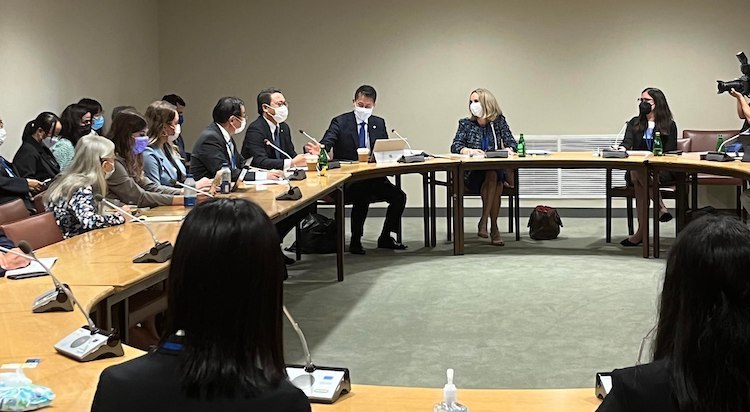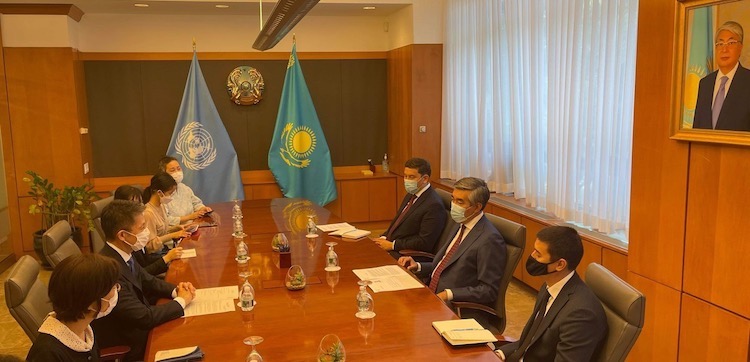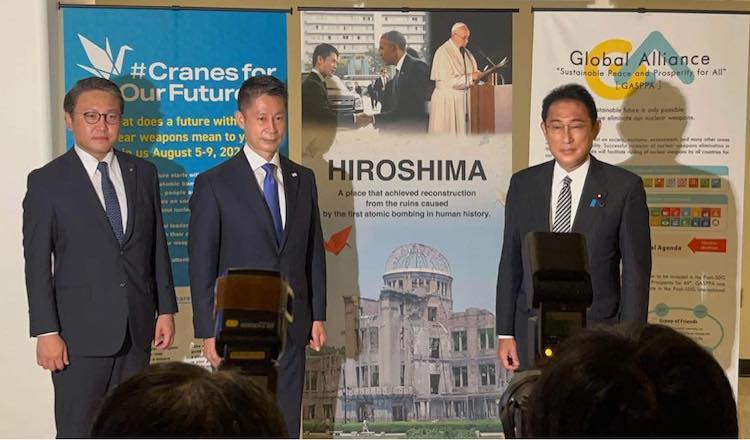Viewpoint by Hidehiko Yuzaki, Governor of Hiroshima, Japan
The following is the content of Hiroshima Governor Hidehiko Yuzaki’s speech at a side event (co-hosted by Nagasaki and Hiroshima Prefectures) under the theme “Nexus between Nuclear Disarmament and Sustainable Future” held at UN Headquarters on August 1, the first day of the 2022 NPT Review Conference. The side event was attended by about 70 diplomats, nuclear disarmament experts, and NGO representatives.
UNITED NATIONS (IDN) — I am Hidehiko YUZAKI, Governor of Hiroshima Prefecture and President of Hiroshima Organization for Global Peace or HOPe for short.
Thank you, everyone, for participating in today’s session. In considering nuclear weapons and sustainability, I would like to begin by examining the Ukrainian crisis. Looking at the relationship between the Ukrainian crisis and the Sustainable Development Goals (SDGs), the crisis has seriously affected initiatives for all the SDGs, not only in Ukraine but also in the rest of the world. For example, the recent decline in wheat exports from Russia and Ukraine, which together account for nearly 30% of global wheat supplies, has exacerbated the food crisis. Such negative impacts on the achievement of the SDGs are becoming evident on a global scale.
Moreover, in the wake of the Ukrainian crisis, the world has been faced with nuclear dangers due to Russia’s threat to use nuclear weapons and the Russian military’s attack on a nuclear power plant in Ukraine. Seventy-seven years ago, Hiroshima and Nagasaki suffered catastrophic damages in every aspect, including industrial and living infrastructure, educational institutions, and healthcare services, with their soil, forests, and ocean seriously contaminated. The use of nuclear weapons would inflict devastating damages on the achievement of every SDG.
Before anything else, many precious lives were lost, including women, children, and the elderly. At the present moment, when we are faced with the Ukrainian crisis, we should remind ourselves again that nuclear weapons constitute an unequivocal threat to the sustainable future of humanity.

Photo: A side event titled “Nexus between Nuclear Disarmament and Sustainable Future” was held at UN Headquarters on August 1. Source: Mariko Komatsu
Several people argue that the possession of nuclear weapons is acceptable as long as they are not used. However, even if not used, nuclear weapons continue to have significant negative impacts on the achievement of the SDGs. Just the production and possession of these weapons have brought about various problems, for example, health damage to uranium miners during the production process, human suffering as well as ocean and forest contamination resulting from nuclear tests, and environmental pollution caused by nuclear waste, to name but a few.
Both Hiroshima and Nagasaki succeeded in reviving themselves from the ashes. However, the precious human lives lost in the nuclear calamity and genetic damage from exposure to radiation could never be restored. Due to this tragedy, an infinite number of traditional assets cannot be passed on to the later generations. It is important to prevent risks before they turn into a catastrophe.
As far as the climate change issue is concerned, there are two ways to deal with it, “mitigation” and “adaptation,” but there can be no adaptation to the nuclear weapons problem, mitigation is difficult, and once nuclear weapons are used, that’s it. In that sense, the issue of nuclear weapons is more serious than climate change, and prevention is the only solution. Now it is our challenge to realize prevention by collecting the wisdom of humanity.

Photo: On August 3, Mr. Hidehiko Yuzaki, the Governor of Hiroshima paid a courtesy visit to the Permanent Mission of the Republic of Kazakhstan. He raised the issues of sustainability and nuclear weapons and introduced his efforts to create an alternative security system to nuclear deterrence, supported by Ambassador Magzhan Ilyassov, the Permanent Representative of Kazakhstan to the United Nations. Ambassador Ilyasov, who has been nominated to chair the First Committee of the UN General Assembly, stated that the issue of nuclear weapons is more pressing than climate change and that his country is ready to be a leader in the field of nuclear disarmament. Credit: Katsuhiro Asagiri
[GASPPA proposal]
– SDGs have focused on comprehensive development in the environment, society and economy fields. Taking into consideration the impact of nuclear weapons on the sustainability of our society, I believe we will need to add safety and security to the next global agenda post the SDGs.
– To this end, HOPe/Hiroshima Prefecture has launched the Global Alliance “Sustainable Peace and Prosperity for All”, or GASPPA. This is a new civil society platform that mainly collaborates with international NGOs and concentrates on sustainability for humankind and the Earth.
The concept phrase for GASPPA is the “Sustainable future is only possible when we eliminate our nuclear weapons.” Collaborating with people carrying out activities primarily in the fields of society and the environment, which are realms outside of nuclear arms, GASPPA is working toward the goal of positioning the abolition of nuclear weapons as a shared challenge for humankind in the post-SDG years, based on the concept of “Sustainable Peace and Prosperity for All.”
Our ambassadors will talk about the participation to GASPPA later. I hope today’s session will illustrate the importance of the perspective from sustainability, in addition to national security and humanity, on which NPT and TPNW have respectively has a focus, when thinking about the nuclear weapon issues. [IDN-InDepthNews – 24 August 2022]
Top photo: Meeting with Japanese Prime Minister Fumio Kishida (right) in front of the Hiroshima (banner) exhibition at United Nations on August 1, 2022. Source: Mariko Komatsu


